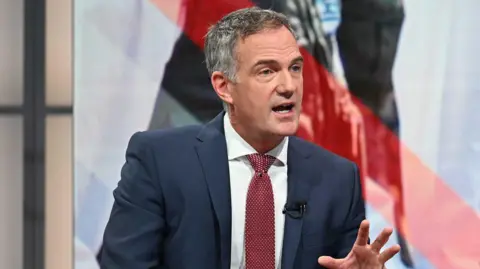In a recent dialogue on financial priorities within UK governance, Peter Kyle, the science and technology secretary, emphasized that law enforcement authorities must be willing to adapt as funding discussions ensue between the Home Office and the Treasury. This statement was made during an appearance on the BBC’s programme “Sunday with Laura Kuenssberg,” where it became evident that police forces are under scrutiny in relation to the upcoming Spending Review.
The core of Kyle’s message revolved around a pressing reality: “every part of society was struggling.” Amidst these pressures, various factions, including healthcare professionals and academic institutions, are advocating for greater financial support. The Spending Review is set to announce a boost in financial provisions for sectors such as education and scientific research, yet it leaves the future of police funding in question. Kyle did not explicitly dismiss the possibility of budget cuts to policing, which has raised concerns among various stakeholders regarding the potential implications for public safety.
Chris Philp, serving as the shadow home secretary and a Conservative representative, expressed his apprehensions about fluctuations in police staffing levels, urging the government to safeguard police budgets. His comments resonate amidst fears that diminished resources could hamper the effectiveness of law enforcement agencies.
Chancellor Rachel Reeves is anticipated to outline the financial allocations for government departments on an upcoming Wednesday, marking a significant moment for budgeting precedents. Earlier statements from Reeves conveyed the challenging nature of this review, indicating that “not every government department would get everything they want.” This suggests that funding reallocation is a contentious topic within the current fiscal landscape.
Reports indicate that within the Home Office, there is skepticism about the feasibility of meeting Labour’s manifesto commitment to extend police personnel numbers. In response to inquiries about police financial backing, Kyle noted that the government had previously allocated an extra £1 billion to support police initiatives, implying ongoing governmental investment in law enforcement. He also called on the police to actively engage in relaying necessary changes and reforms to enhance their operational effectiveness.
Kyle stated, “Money is part of how we change our country for the better. And reform—modernization, using technology, doing things in the way that people would expect our public services to be doing in the 2020s—is the other part.” This articulation of priorities underscores the critical crossroad at which public services stand, particularly as police departments confront the realities of technological advancement amid funding pressures.
The integration of modernization has also sparked concern among law enforcement leaders. Notable figures, including Sir Mark Rowley, the head of the Metropolitan Police, have voiced alarm over the constraints imposed by years of budget reductions, illustrating how these cuts may have allowed technological frameworks to deteriorate.
The conversation around police funding also intersects with broader political arguments. Philp highlighted that the onus is on the Labour government to curb lavish spending in other areas to ensure police budgets remain intact, singling out expenditures relating to environmental initiatives and public sector salary increments as potential savings.
Furthermore, Richard Tice, the deputy leader of Reform UK, chimed in by advising the administration to eliminate waste within council finances, positing that excess spending could jeopardize critical services. He advocated for more prudent management within governmental frameworks.
As the government continues its work on transformative financial packages, such as the recently announced £86 billion for scientific advancements and an additional £30 billion earmarked for the NHS, the prospects of spending create an impression of disparity. The prioritizations signal a contrasting challenge in reconciling necessary societal investments against stringent budgetary limitations, particularly for policing.
With a comprehensive focus on public welfare and essential services, Kyle, in his remarks, expressed empathy towards societal strains while recognizing the economic growth within the G7. He noted, “We are the fastest growing economy in the G7 but we know that people aren’t feeling it in their pockets yet,” indicative of the dissonance between economic indicators and public sentiment regarding financial distribution.
Hence, as the Spending Review approaches, expectations surrounding resource allocation bear significant consequence, potentially delineating the future functionalities of essential services like police forces and educational institutions amidst evolving societal demands.



